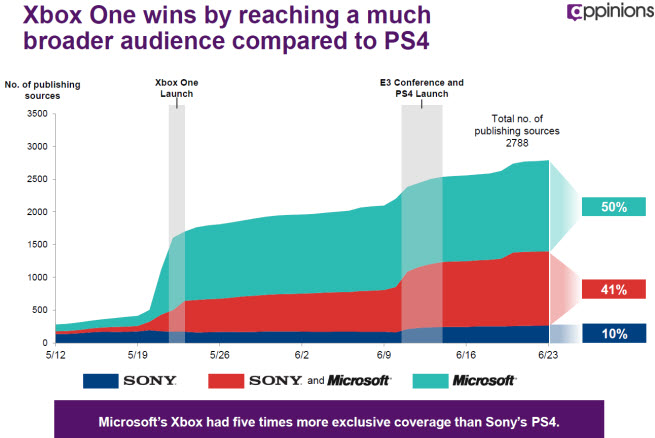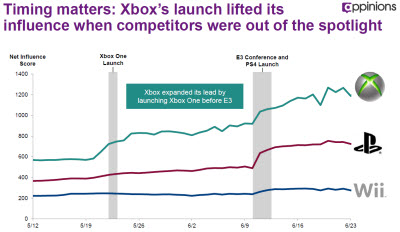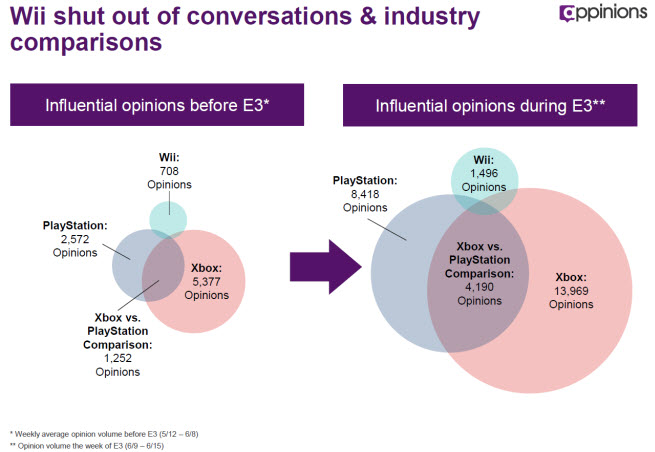In the press, Microsoft got clobbered at the Electronic Entertainment Expo (E3) as critics said that Sony’s PlayStation 4 appeared to have a better show than Microsoft’s Xbox One game console. But a study of opinions on the Internet by market researcher Appinions shows that Microsoft came out of gaming’s biggest event as the most talked about console maker.
Appinions sifts through the Internet to discover the influential conversations on topics such as gaming. Based on an analysis of 60 days of Internet conversations and six million sources of data from April 27 to June 27, Microsoft dominated.
In some sense, this is not necessarily winning the war of opinion. It’s more like winning the war of attention. Microsoft generated a lot more opinions, but if those opinions were negative toward Microsoft, then it would in fact lose the war of favorable opinion. That’s a subtlety that Appinions didn’t measure in this particular study.
Microsoft grabbed a lot of attention simply by making a big announcement on May 21 — well before the show and long after Sony’s February announcement of the PlayStation 4. Appinions tracked the “net influence score” (or the aggregate score of influencers’ capability to influence opinions of others) of the Big Three (Sony, Nintendo, and Microsoft) console makers during that time and found that Xbox One dominated the conversation, followed by Sony and then followed distantly by Nintendo. Microsoft maintained its leadership in influence through the end of June, but Sony had a sharper bounce during E3 itself.
“Influencers are so important to the buyer’s journey because they are trusted,” said Larry Levy, the cofounder and chief executive of Appinions. “The effect they have on decision-making, which impacts a company’s bottom line and is substantial, which is why we empower brands in this specific area. This study shows brands and executives, especially in the console area, where they are, perhaps where they want to be and reveals the types of opinions and people that are the most influential. There’s power in that information.”
The Xbox brand had five times more exclusive coverage than Sony’s PlayStation 4. Of 2,788 publishing sources, 50 percent mentioned Microsoft exclusively while 10 percent mentioned Sony exclusively. About 41 percent mentioned both Sony and Microsoft together.
However, Sony scored some points when Microsoft began the (mostly negative) conversation about digital rights management (DRM). On May 21, when Microsoft announced the Xbox One, it said it would restrict how gamers could buy and sell used games. Appinions said that Sony hijacked the discussion about DRM at E3 when it announced that it would permit consumers to buy and sell physical games just as they have been accustomed to in the past. After the show, Microsoft backed off on its stance and then returned to dominating the conversation.
Appinions defines an “influencer” as a person, brand, or company that expresses a contextually relevant opinion that is meaningful enough to get others to respond. Influence is calculated based on the frequency of actions the opinions generate, the credibility of the publications in which the opinions appear, and diversity of publications carrying the opinions.
Unfortunately for Nintendo, the Wii U and the Wii consoles were pretty much shut out of the conversation — both before E3 and afterward. Microsoft’s Xbox brand was part of 62 percent of the opinions related to consoles registered in the month before E3. PlayStation was about 30 percent of the opinions in the same time frame.
The Wii was part of just 6 percent of the conversations after E3. Sony’s PlayStation was part of 35 percent, and Microsoft’s Xbox was part of 58 percent. About 17 percent of the opinions directly compared the PlayStation and the Xbox brands, but very few mentioned the Wii brand.
Appinions found that people talk most about consoles and handhelds beyond the level of sales those products account for in the industry. For instance, consoles and handhelds have a net influence score of 1,633, accounting for 75 percent of the conversations around games, compared to 47 percent of industry sales. PC, mobile, and social games are vastly underrepresented, considering those sectors account for about half of industry sales and only 25 percent of the conversations.
The study also found that the most influential people in the gaming industry were bloggers, with seven out of 10 top influencers. Jack Tretton, head of Sony Computer Entertainment of America, was the top executive influencer, coming in at No. 4 overall while Don Mattrick (then-head of Microsoft’s game business) was No. 6. Michael Pachter, analyst at Wedbush Securities, was the only analyst in the top 10 at No. 7.
The top five influencers among the industry were Microsoft, Sony, Electronic Arts, Nintendo, and Konami. The top five executives were Jack Tretton, Don Mattrick, Mark Pincus (chief executive of Zynga), Satoru Iwata (president of Nintendo), and Larry Hryb (director of programming for Xbox Live at Microsoft).
VentureBeat's mission is to be a digital town square for technical decision-makers to gain knowledge about transformative enterprise technology and transact. Learn More



